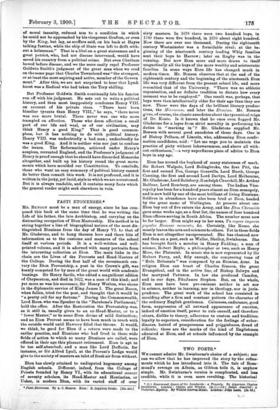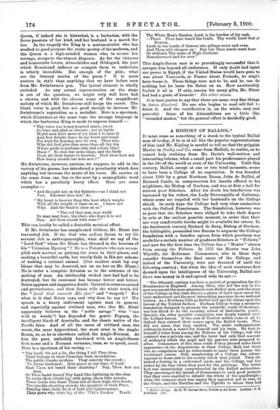TWO POETS.*
WE cannot admire Mr. Swinburne's choice of a subject; nor can we allow that he has improved the story by the refine- ments which he has introduced into it. The tale of Rosa- mund's revenge on Alboin, as Gibbon tells it, is anyhow simple. Mr. Swinburne's version is complicated, and less credible, while it is even more revolting. The historical (1.) Rosamund, Queen of the Lombards : a Tragedy. By Algernon Charles Swinburne. London : Chatto and Windus. [66.]—(2.1 Satan Absolved: TIctortan Mystery. By Wilfrid Scaweu Blunt. London; John LIU. Lea ed.]
Queen, if indeed she is historical, is a barbarian, with the fierce passions of her kind, and her husband is a match for her. In the tragedy the King is a sentimentalist who has studied to good purpose the erotic poetry of the moderns, and the Queen is a high-minded woman who, to secure her revenge, stoops to the utmost disgrace. As for the virtuous and honourable lovers, Almachildes and Hildegard, the part which Rosamund induces or compels them to undertake is utterly incredible. But enough of the plot ; what are the literary merits of the poem P It is more austere in style than anything that we have before seen from Mr. Swinburne's pen. The lyrical element is wholly excluded. As any actual representation on the stage is out of the question, we might very well have had a chorus, and with the chorus some of the magnificent melody of which Mr. Swinburne still keeps the secret. The blank verse is good, but not good enough to increase Mr.
Swinburne's reputation as a melodist. Here is a specimen, which illustrates at the same time the strange language in which the barbarian King is made to express himself :-
" Thy voice was honey-hearted music, sweet
As wine and glad as clarions : not in battle Might man have more of joy than I to hear it And feel delight dance in my heart and laugh Too loud for hearing save its own. Thou rose, Why did God give thee more than all thy kin Whose pride is perfume only and colour, this ?
Music ? No rose but mine sings, and the birds
Hush all their hearts to hearken. Dost thou hear not How heavy sounds her note now ? "
Mr. Swinburne, however, anxious, we suppose, to add to the variety of his poems, has introduced a peculiarity which does anything but increase the music of his verse. He carries on the sense from one line to the next by a monosyllabic word which has a peculiarly heavy effect. Here are some examples :-
" And thought not on thy flatteries—as I think not Now. Knowest thou not," &c.
" My heart is heavier than this heat which weighs With all the weight of June on us. I know not Why. And the feast is close on us."
" The rod that man may wield
No man may fear ; the slave who fears it is not Man. Art thou crazed with wine ?"
This can hardly be called a desirable metrical effect.
If Mr. Swinburne has complicated Gibbon, Mr. Blunt has travestied Job. If the God who suffers Satan to try his servant Job is anthropomorphic, what shall we say of the "Lord God" whom Mr. Blunt has throned in the heavens of his " Victorian Mystery " ? He is a Potentate who can accom- plish such matters as putting the stars in their places, and
making a beautiful earth, but totally fails in His pet scheme of making a rational animal. (Our readers must lay any blame that may be deserved, not on us, but on Mr. Blunt.) He is under a complete delusion as to the outcome of the making of man. An intolerably wicked race had had to be
destroyed, but its successor has become better and better. Satan appears and suggests a doubt. Gabriel is cross-examined and prevaricates ; and then Satan tells the whole truth, till
the "Lord God covereth, His face" and " weepeth." But what is it that Satan says, and why does he say it? His speech is a heavy indictment against man in general, and especially against civilised man, who (for Mr. Blunt apparently believes in the " noble savage " who " rau wild in woods ") has degraded the gentle Papuan, the intelligent black of Australia, and the chaste native of the Pacific Isles. And of all the races of civilised man, the worst, the most hypocritical, the most cruel is the Anglo-
Saxon, or, as he is elsewhere called, the Anglo-Norman. At him the poet, unluckily burdened with an Anglo-Saxon first name and a Norman surname, runs, so to speak, amok. Here is a specimen of his raving :- " Nay Lord, 'tie not a lie, the thing I tell Thee thus.
Their bishops in their Churches lead, incredulous, The public thanks profane. They sanctify the sword- ' Te Deum laudamus. Give peace in our time, 0 Lord.'
Hast Thou not heard their chanting ? Nay, Thou dolt not hear, Or Thou badst loosed Thy hand like lightning in the clear To smite their ribald lips with palsy, these false priests, These Lords who boast Thine aid at their high civic feasts, The ignoble shouting crowds, the prophets of their Press,
Pouring their daily flood of bald self-righteousness, Their poets who write big of the 'White Burden.' Trash
The Whits Man's Burden, Lord, is the burden of his cash. —There. Thou bast beard the truth. Thy world, Lord God of Heaven, Lieth in the hands of thieves who pillage morn and even. And Thou still sleepest on ! Nay but Thou needs must hear Or abdicate Thy name of High Justiciar Henceforward and for ever."
This Anglo-Saxon race is so provokingly successful that it enrages him beyond all endurance. If only Arabi had upset our power in Egypt, if the United States would have gone to war about Venezuela, or France about Fashoda, he might have borne it. These things were not to be, and he can do nothing but let loose his Satan on us. How unutterably foolish it all is. If only, among his many gifts, Mr. Blunt had had a grain of humour ! Dis aliter visum.
It is bare justice to say that there are some very fine things in Satan Absolved. No one who begins to read will fail to finish it. And the versification is, on the whole, easy and powerful. Some of his Alexandrines are a little like "wounded snakes," but the general effect is decidedly good.







































 Previous page
Previous page